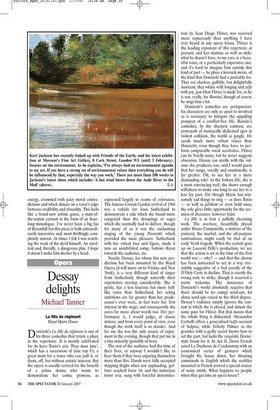Dessay delights
Michael Tanner La fille du regiment Royal Opera House Donizetti's La fille du regiment is one of his three comedies that retain a place in the repertoire. It is mainly celebrated for its hero Tonio's aria 'Pour mon ame', which has a succession of nine top Cs, a great stunt for a tenor who can pull it, or them, off, but without artistic interest. But the opera is usually revived for the benefit of a prima donna who wants to demonstrate her comic prowess, as expressed largely in reams of coloratura. The famous Covent Garden revival of 1966 was a vehicle for Joan Sutherland to demonstrate a side which she found more congenial than the droopings or rages which she normally had to deliver, though for many of us it was the enchanting singing of the young Pavarotti which provided the main pleasure. Sutherland, with her robust face and figure, made it into an uninhibited romp, bottom thrust towards the audience, etc.
Natalie Dessay, for whom this new production has been mounted by the Royal Opera (it will move on to Vienna and New York), is a very different kind of singer from Sutherland, though naturally their repertoires overlap considerably. She is petite, has a less luscious but more belllike voice than Sutherland, her acting ambitions are far greater than her predecessor's ever were, in fact were her first interest in the stage, and consequently she cares far more about words too. Her performance is, I would judge, of classic stature, and from every point of view, even though the work itself is so slender. And for me she was the only source of enjoyment in the evening, though that put me in a tiny minority (possibly of two).
The rest of the audience had the time of their lives, or anyway I wouldn't like to hear them if they were enjoying themselves more than this. Hands were fully occupied slapping thighs when not applauding, guffaws reached force 10, and the notorious tenor aria, sung with forceful determination by Juan Diego Florez, was received more rapturously than anything I have ever heard in any opera house. Florez is the leading exponent of this repertoire at present, and has stamina as well as style; what he doesn't have, to my ears, is a beautiful voice, or a particularly expressive one, and it's hard to imagine him outside this kind of part — he plays a lovesick swain, of the kind that Donizetti had a partiality for. They are clueless, gullible, but delightfully innocent, they whine with longing and yelp with joy, just what Florez is made for, as he is not, really, for Rossini, though of course he sings him a lot.
Donizetti's comedies are prelapsarian: his characters are only as upset or involved as is necessary to mitigate the appalling prospect of a conflict-free life. Rossini's comedies, by the sharpest contrast, are portrayals of maniacally dedicated egos in violent collision, the world as jungle. He needs much more robust voices than Donizetti, even though they have to perform comparable vocal acrobatics. Florez can be briefly noisy, but he never suggests obsession. Dessay can startle with the volume she produces, too, and I would guess that her range, vocally and emotionally, is far greater. Oh, to see her in a more demanding role! As the forlorn fille, she is a most convincing waif; she shows enough wilfulness to make one long to see her in a less fey part. For though Marie has winsomely sad things to sing — as does Tonio — as well as jubilant or even bold ones, the role gives little opportunity for the creation of character, however faint.
La fille is at best a pallidly charming work. The overture, beautifully played under Bruno Campanella, a mixture of the pastoral, the martial, and the all-purpose rumbustious, might easily be that of an early Verdi tragedy. When the curtain goes up on Laurent Pelly's production, we see that the action is set at the time of the first world war — why? — and that the chorus has been instructed to act in a way irresistibly suggestive of a bad parody of the D'Oyly Carte in decline. That is exactly the wrong note to strike, though it received a warm welcome. The innocence of Donizetti's world absolutely requires that there should be no campy send-ups, let alone send-ups raised to the third degree. Dessay's radiance simply ignores the context in which she is placed, and almost the same goes for Florez. But that means that the whole thing is dislocated. Alessandro Corbelli offers a generalised buffo account of Sulpice, while Felicity Palmer as the grandee with a guilty secret knows how to act the part, but lacks the requisite Hornestyle boom for it. In Act II, Dawn French acted La Duchesse de Crackentorp with an economical series of gestures which brought the house down; her shouting commands in English which the surtitles mounted in French proved a special source of noisy mirth. What happens to people when they get into an opera house?





















































 Previous page
Previous page